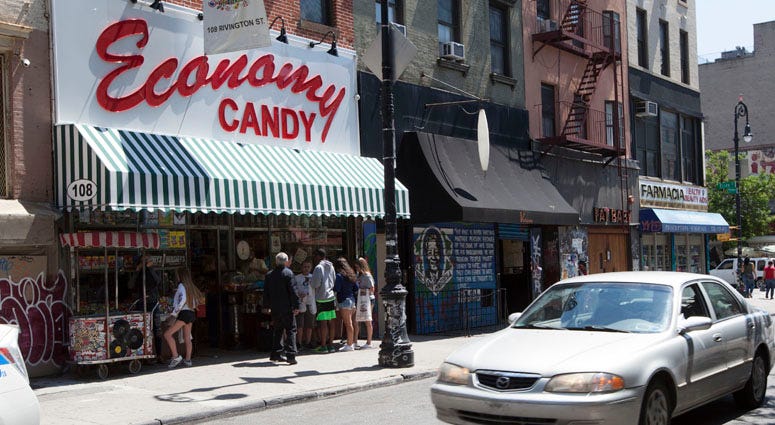Small Business Owners Try To Stay Afloat, Pay Workers Amid Coronavirus Pandemic
By Neil A. Carousso
NEW YORK (WCBS 880) – The coronavirus pandemic hit thriving local food and hospitality businesses hardest, halting sit-down eateries and slowing foot traffic as government imposed unprecedented actions to shut restaurants and people practice social distancing in an effort to slow the spread of the deadly disease.
Two weeks ago, Seth Goldstein – the franchisee of three Jersey Mike’s Subs locations on Long Island – was preparing for its annual “Month of Giving” initiative in which the chain projected to donate $8 million from its nationwide sales on March 25 to The Make-A-Wish Foundation. Now, Jersey Mike’s is trying to stay afloat and continue to pay its workers.
“We want to make sure we can pay our full-time people,” Goldstein said, noting he considers all employees who work 40 hours or more a week to be “full-time.” “We got to take care of the people who are taking care of us all the time.”
He will apply for any interest-free loans provided as a stimulus by the federal government.
He slashed hours for students who are now home looking for more work.
Goldstein’s sub shops are currently open from 11 AM-8 PM. Its normal hours are 10 AM-9 PM. He is anticipating Jersey Mike’s will further reduce operating hours with the sub shop open only for take-out and delivery.
In an effort to slow the spread of COVID-19, New York Gov. Andrew Cuomo announced this week that all restaurants and bars in New York, New Jersey and Connecticut will be closed to dining in and may only provide food take-out and delivery services.
“We are seeing about a 30-35 percent drop-off in the sandwiches that we make,” said Goldstein who measures his business by “bread count.”
As an entrepreneur from the time he graduated college, he understands the importance of making adjustments. Goldstein’s foray into business was when he bought a piece of the Baskin-Robbins store he worked at as a 14 and 15 year old with his life savings and then some.
“I’m hoping that people still come out when they eat lunch,” said Goldstein who now sees it as inevitable that technology will disrupt the fast-food business.
“I think that a lot of people will be working from home on a split-basis going forward. I think that our business has changed a little bit in the fact that a lot of our online ordering will be augmented here, a lot of the delivery systems will be augmented here.”
Even an 83 year old business on the Lower East Side is seeing an unprecedented decline in sales this week.
“We’ve gotten through 9/11, we’ve gotten through the hurricane, Sandy, we will work to get through this as well, but we’ve never had to close down,” said Mitchell Cohen, the third-generation owner of Economy Candy – an old-fashioned candy store that carries all the classics from Black Jack to Clove Gum and 2,000 more selections.
Cohen’s store was impacted by President Donald J. Trump’s travel ban on foreigners coming to the U.S. from most European nations. Economy Candy thrives on tourist food traffic.
He has adjusted work schedules and reduced in-store hours for workers to for health reasons and insists he needs to pay all his employees.
“[I need to > take care of them so they can take care of their bills and their families,” said Cohen.
During a devastating week for in-store sales in an eerily vacant Lower Manhattan, the former Wall Street analyst who grew up in his family’s candy shop realized new ways to be efficient and market to potential new customers.
“I don’t believe I’ve ever gotten this much in the weeds on scheduling and inventory management and that kind of thing,” Cohen said laughing. “Luckily, we still have suppliers that are still delivering because they need the business, too, so there could be a trickle-down effect. If we could get some business online, I could get some orders to other people and I keep on going down the road.”
For many small business owners across the country, the impact of the pandemic was felt immediately.
Richard Bayliss, owner of Nu-Way Cleaners and Tailors in White Plains, which has been in the family for 75 years, said he didn’t see this coming.
“It wasn’t a gradual thing where you could turn around and say, ‘Let’s try to do this, let’s try to do that,” he told WCBS 880’s Mack Rosenberg.
Bayliss relies on delivery service as one of his main sources of income. Nu-Way usually delivers to 150 homes per day, but Bayliss says it’s down to a quarter of that now.
When you walk into nu-way, you feel like you’re in a factory. Pants and jackets fly from clotheslines overhead, while cashiers at several registers figure out what goes where, and how much it’ll cost you. Bayliss employs around 30 people. Most of them have worked for him for at least 10 years.
“You got these people that are working people. It just breaks my heart because I don’t really want to lay anybody off. We’re cutting their hours back. It’s hard when you go up to them and they’re supposed to work until 6, and you have to say ‘Well do you want to go home at 1 today,'” he said.
Bayliss says morale is still strong in the store, and there are no plans to close.








